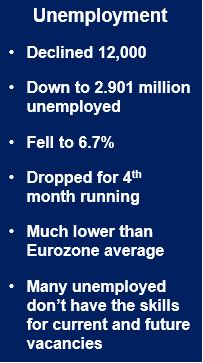German March unemployment declined by 12,000 to 2.901 million or 6.7%, more than the 7,500 to 10,000 fall that had been forecast by analysts. The Federal Labor Office said a particularly mild winter helped boost employment levels across the country.
German March unemployment fell for the fourth successive month, highlighting Europe’s largest economy’s strength.
Frank-Juergen Weise, head of the Labor Office said prospects are looking more hopeful for unemployed people in German.
However, many economists say that a large proportion of the country’s unemployed people do not have the necessary skills to fill current and future job vacancies.
Domestic demand expected to pick up
As unemployment falls wages tend to accelerate at a higher pace, which helps boost domestic demand. Recent strikes by public sector workers and airline pilots suggest employees are starting to feel they are in a stronger position regarding wage negotiations.

A combination of moderate inflation combined with falling unemployment should boost private consumption within the Germany economy.
Data published yesterday showed that retail sales grew for the second month running. The German government is hoping domestic demand will fuel growth in 2014, because exports are expected to either fall or remain flat.
Reuters quoted Christian Schulz, an economist at Berenberg Bank, who said “Good news all round. The fact that unemployment just continues to go down reflects the strength of this recovery.”
Huge differences in Eurozone unemployment rates
A major problem in the Eurozone, the area within the European Union that uses the euro as a national currency, is the disparity in the economies of its Member States. In Spain, for example, the unemployment rate is more than four times greater than in Germany.
The Eurozone’s average unemployment rate is 11.9%, according to Eurostat, considerably higher than Germany’s 6.7%.
Even within Germany itself there is still an east-west divide, with western states reporting much slower unemployment declines than in the east.
According to the Bundesbank, the economy most likely strengthened “substantially” in Q1 2014, after growing by 0.4% in Q4 2013, beating forecasts.
In an interview with Bloomberg, Holger Schmieding, chief economist at Berenberg Bank in London, said “The underlying trend is a gradual decline in German unemployment over the course of the year. However, unemployment cannot fall much further because the people who are still unemployed do not have the skills needed to find jobs.”
Written by [google_authorship]

